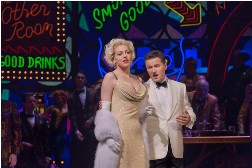Review: Rigoletto

It’s not often you see a half-naked pole dancer cavorting onstage at the Metropolitan Opera House. But that’s just one of the many startling sights in their new production of Rigoletto. Staged by theater director Michael Mayer (Spring Awakening, American Idiot) in his Met Opera debut, this audacious version of Verdi’s 1851 classic has been reset to 1960’s era Las Vegas. And while the updating has the sort of logistical flaws typical of such operatic revampings, it’s an entertainingly robust and imaginative rendition that should attract fresh audiences.
There’s no doubt that we’re no longer in 15th century Italy from the first glimpse of Christine Jones’ lavish set design of a Vegas casino emblazoned with neon signs and the performers clad in Susan Hilferty’s tacky, brightly-colored costumes. Here, the Duke (Piotr Beczala) is a womanizing, Sinatra-style lounge singer in a white dinner jacket, grabbing a microphone to sing his aria “Questa o quella” to an adoring crowd.
The hunchbacked Rigoletto (Zeljko Lucic) is his sidekick, an abrasive, Don-Rickles type comedian. The basic story, adapted from a Victor Hugo play, manages to come through clearly in this conception. The Duke seduces Rigoletto’s beautiful virginal daughter Gilda (Diana Damrau), thereby incurring his wrath. He hires a killer, Sparafucile (Stefan Kocan), to exact revenge, with inevitable tragic results.
This sort of thing has been done many times before, with Rigoletto in particular having undergone numerous transformations in its long performance history, including a famous version staged by Jonathan Miller for the English National Opera that was set in 1950’s Little Italy. But the opera, unlike certain others in the standard repertory, is strong enough to endure such tampering. Here, even the jarringly slang-laden translation delivered via surtitles is more amusing than heretical.
And, as is usual for the Met, the production is beautifully sung. Polish tenor Beczala does beautifully by such familiar arias as La donna e mobile” while delivering a smoothly charismatic performance. Serbian baritone Lucic makes a strong vocal impression as the Duke, even if his acting leaves something to be desired. German soprano Damrau sings luminously as the doomed Gilda, and Slovakian bass Kocan makes for a memorably oily hit man, inspiring chills with his deep rumblings. Belarussian mezzo-soprano Oksana Volkova is also memorable, both visually and aurally, as Sparafucile’s seductive sister Maddalena. Italian conductor Michele Mariotti presides over the proceedings expertly, fully mining the riches of Verdi’s score.
Clever touches abound, such as when Gilda’s near-dead body is disposed of not by bundling it into a sack but instead stuffed into the truck of a vintage Cadillac. During the storm scenes, flash of neon lightning crisscross the set. And Monterone (Robert Pomakov), the count who places a fateful curse on
Purists will inevitably scoff. But there’s no denying that this Rigoletto is a freshly invigorating, especially when compared to such recent Met productions as their drearily monochromatic Don Giovanni. And it will probably play terrifically in its Feb. 16 broadcast as part of the increasingly popular Live in HD series, shown in movie theaters around the world.
Metropolitan Opera House, Lincoln Center. 212-362-6000. www.metopera.org. Through May 1.
| Print article | This entry was posted by Frank on 02/05/13 at 11:58:39 pm . Follow any responses to this post through RSS 2.0. |